The cities of the world, after a year of facing a prodigious pandemic response effort, now face the challenge of assuring an equitable vaccine rollout among their residents—at a time when COVID-19 has exacerbated health disparities, racial injustices, economic divides and more. The Partnership for Healthy Cities—supported by Bloomberg Philanthropies in collaboration with the World Health Organization and Vital Strategies—held a special VitalTalks event on April 15 which featured two mayors in the global network to share their strategies for making vaccine equity a reality and offering lessons learned after a year of facing crisis after crisis.
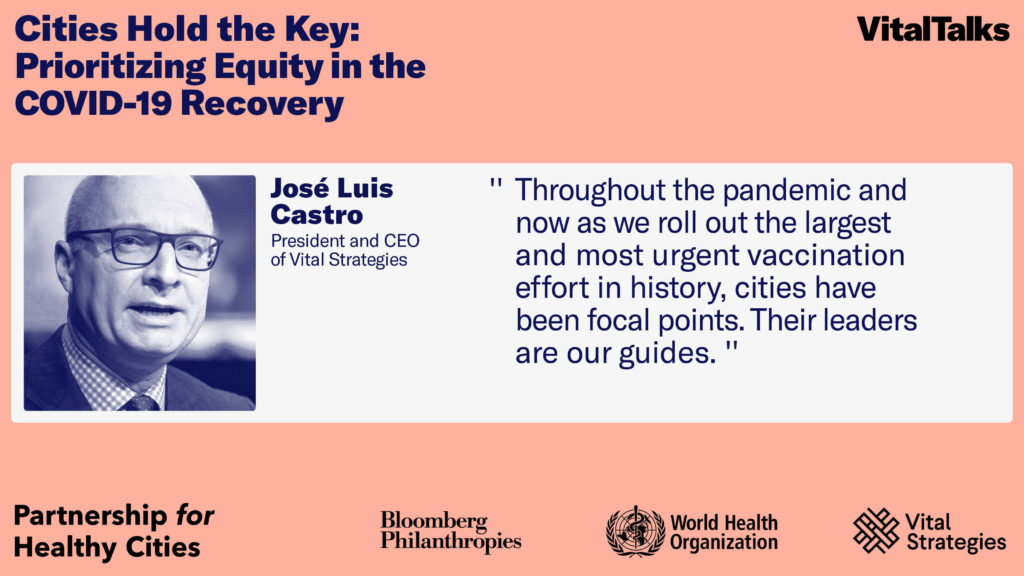
“We’re at a defining moment in public health, and cities are leading the way,” said Vital Strategies President and CEO José Luis Castro, introducing Mayor Lori Lightfoot of Chicago, United States and Intendant Carolina Cosse of Montevideo, Uruguay, in a discussion moderated by CNN International’s Hannah Vaughan Jones that drew an audience of 700 people from 84 countries.
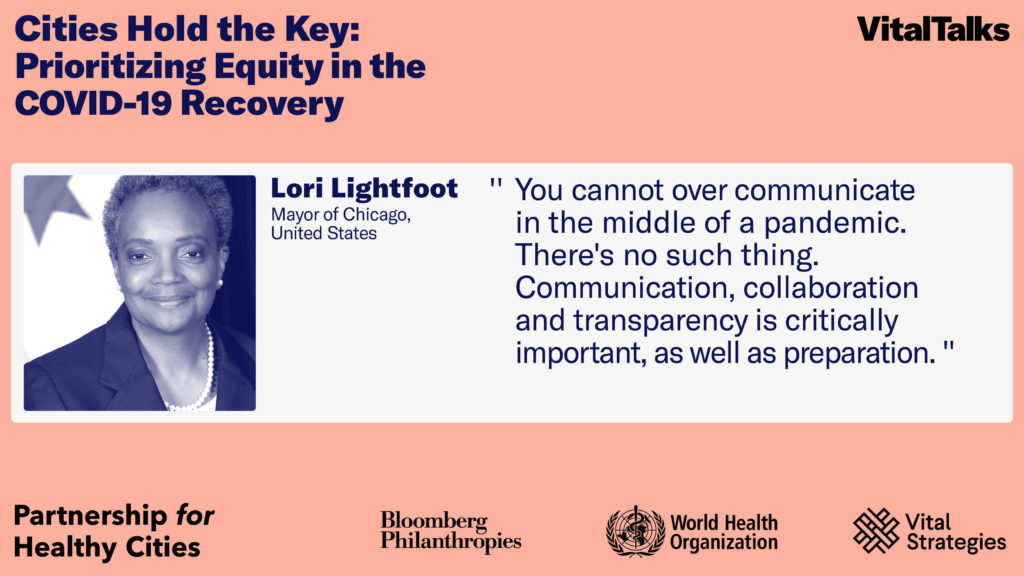
Mayor Lightfoot said Chicago’s vaccine plan builds off strategies developed earlier in the pandemic when it became apparent that Black residents were dying of COVID-19 at seven times the rate of other Chicagoans. The city created a Racial Equity Rapid Response Team to put resources where they were needed most and built the groundwork for tackling inequities in the long term. “Communication, collaboration and transparency is critically important,” she said, describing how these pillars informed Chicago’s decision to dedicate a proportion of vaccines to primarily Black and Latinx neighborhoods.
Similarly, Carolina Cosse of Montevideo, Uruguay, said her city’s COVID-19 emergency plan—a community-based program known as the ABC Plan—was made permanent when it became clear it was meeting long-term needs such as food insecurity. While vaccine distribution lies with the national government, Montevideo’s network of clinics and mobile health vans is the backbone of vaccine and other COVID-19 information and services for low-resource communities, complemented by programs that address child nutrition and other fundamental concerns.
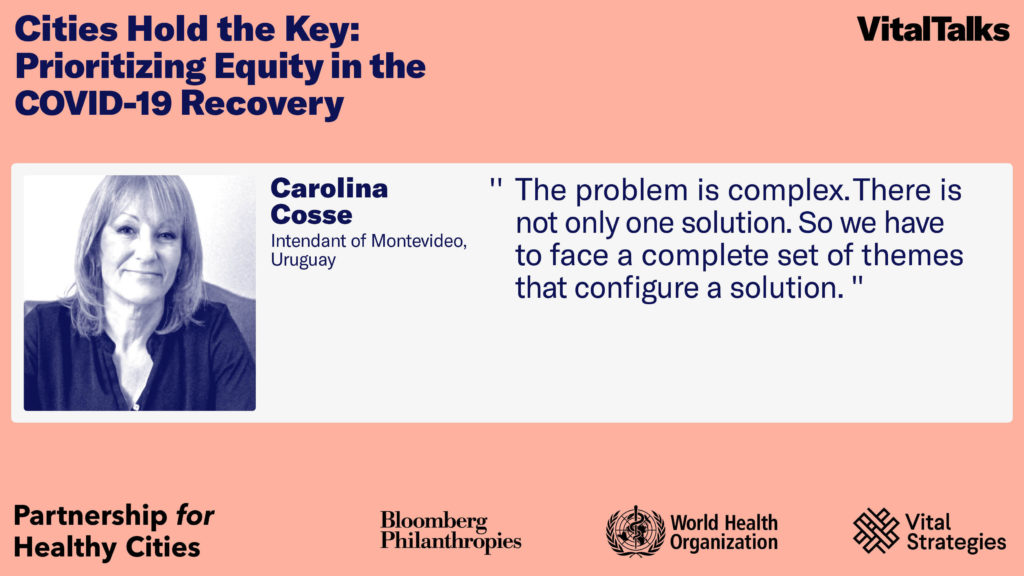
Mayor Lightfoot and Intendant Cosse also voiced the challenges in their city’s reception to the vaccine, including hesitancy. City leaders play a critical role in instilling confidence and providing timely, accurate messaging to their residents. In Chicago, Mayor Lightfoot’s team shares information with the public through Facebook Lives and other platforms, calming residents’ fears and ensuring access to accurate, accessible and transparent public health data. Intendent Cosse also makes sure to provide residents the “full picture”, including critical data about the COVID-19 landscape.
Cities Hold the Key: Prioritizing Equity in the COVID-19 Recovery kicked off with remarks from Dr. Tedros Adhanom Ghebreyesus, Director-General of the World Health Organization, and Michael R. Bloomberg, WHO Global Ambassador for Noncommunicable Diseases and Injuries, 108th mayor of New York City and founder of Bloomberg Philanthropies.
Dr. Tedros underlined the importance of vaccine equity, stating: “Equitable access to COVID-19 vaccines is essential, just as equitable access to all health services is at the heart of universal health coverage.”
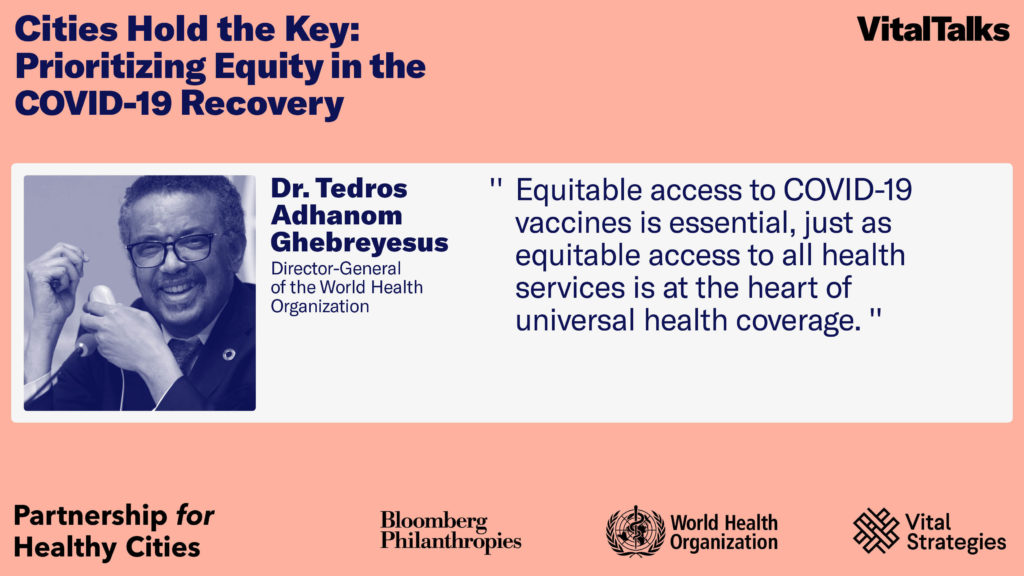
Mike Bloomberg emphasized the role of cities in rebuilding stronger health, social and economic systems: “As we move into the next phases of the pandemic, the role of cities will remain critical to implementing public health policies that protect all citizens, no matter where they live or what they look like.”
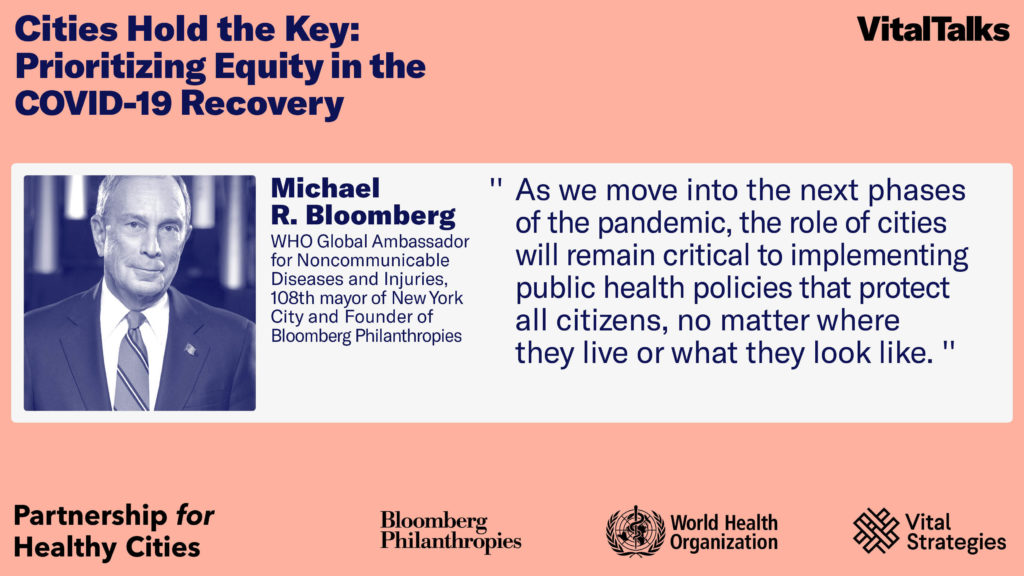
Both mayors echoed this message, casting their drives for public health fairness as part of a long-term strategy for improving every aspect of cities’ well-being.
Chicago’s Mayor Lightfoot said of the pandemic, “I see this an opportunity for us to build a really foundational infrastructure to work on community health issues and disparities.”
Montevideo’s Intendant Cosse noted that COVID-19 has forced cities to develop their capacity for collecting and using data about people’s health and how they live—and build it into the process of policymaking: “Now, scientists and [governments] will have to sit together and work on solutions,” she said.
The world’s pandemic recovery is far from over, with infection rates continuing to rise in many areas and the vaccine rollout uneven. The hope is that, with innovative thinking and continuous communication between cities, we will get there more quickly and equitably.
Watch the VitalTalks Event—Cities Hold the Key: Prioritizing Equity in the COVID-19 Recovery
Learn more about the Partnership for Healthy Cities COVID-19 Response Center: https://cities4health.org/
For more information, visit: https://www.vitalstrategies.org/vitaltalks/
Follow us on Twitter: @VitalStrat
About the Partnership for Healthy Cities:
The Partnership for Healthy Cities is a prestigious global network of cities committed to saving lives by preventing noncommunicable diseases (NCDs) and injuries. Supported by Bloomberg Philanthropies in partnership with WHO, as well as Vital Strategies, this initiative enables cities around the world to deliver a high-impact policy or programmatic intervention to reduce NCDs and injuries in their communities. For more information, visit: https://partnershipforhealthycities.bloomberg.org/
The Partnership for Healthy Cities COVID-19 Response is part of the $40 million Bloomberg Philanthropies COVID-19 Global Response Initiative. By collaborating with the WHO and Resolve to Save Lives, an initiative of Vital Strategies, the Partnership for Healthy Cities COVID-19 Response is working hand-in-hand with the world’s leading experts on epidemic prevention.